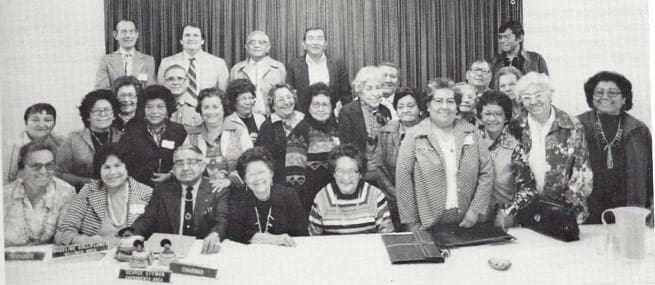The Creation of the National Indian Council on Aging
The National Indian Council on Aging, Inc. (NICOA) is a 501(c)(3) nonprofit organization founded in 1976 by members of the National Tribal Chairmen’s Association who called for a national organization focused on aging American Indian and Alaska Native elders. Members included the late Wendell Chino (Mescalero Apache), the late Joe DeLaCruz (Quinault) and other tribal leaders. These leaders saw the need for a national organization whose sole purpose would be to advocate for improved comprehensive health, social services and economic well-being of American Indian and Alaska Native elders.
The first National Indian Conference on Aging was sponsored by the National Tribal Chairman’s Association in Phoenix, Arizona, on June 15-17, 1976, and led by President Wendell Chino. Close to 1,500 American Indians and Alaska Natives representing 171 tribes came to speak of their needs and present recommendations for action to improve the quality of their communities.
In his address to the conference attendees President Wendell Chino spoke about the history of contributions that American Indian and Alaska Native elders have given to the U.S. He reminded American Indians and Alaska Natives as well as U.S. congressional leaders that American Indians and Alaska Natives have a unique status as they are specifically mentioned in the U.S. constitution. Robert J. Miller, author of “Native America, Discovered and Conquered: Thomas Jefferson, Lewis & Clark, and Manifest Destiny,” expands on this position:
“American Indian tribes have played a major role in the development and history of the United States and have engaged in official, diplomatic governmental relations with other sovereign governments from the first moment Europeans stepped foot on this continent. Indian tribes have been a part of the day to day political life of the United States and continue to have an important role in American life today. Tribes continue to have a government to government relationship with the United States and they continue to be sovereign governments with primary control and jurisdiction over their citizens and their territories. It is no surprise, then, that the relationship between Indian people, tribal governments and the United States is addressed in the United States Constitution.”
This important gathering led to the creation of NICOA. NICOA carries on the mission to advocate for improved comprehensive health, social services and economic well-being for American Indian and Alaska Native elders.
Prior to the 1976 National Indian Conference on Aging, recommendations were formulated by the Session on the Elderly Indian at the 1971 White House Conference on Aging. The recommendations were endorsed and reconfirmed by the participants in the 1976 National Indian Conference on Aging. The recommendations were: (1) not terminate Indian tribes (abrogating treaties with the result that Indian tribes would no longer be federally recognized), (2) establish an Indian desk within the Administration on Aging, (3) amend the provision within the Older Americans Act to permit funding from the federal government to flow directly to American Indian and Alaska Native tribes (these tribes would no longer have to go through state agencies for funding), (4) increase Administration on Aging funding to adequate amounts in order to serve American Indians and Alaska Natives, (5) create grants that fund research programs that look at existing laws and policies that serve the elderly Indian population.
